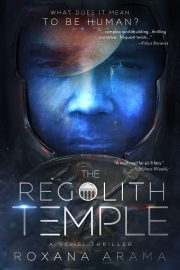Using Unreliable Narration to Create Voice
by Priya Chand
All narrators are unreliable.
If you’re reading this thinking “hey, you’re misusing the term; ‘unreliable narrator’ refers to a specific convention”–well, I’m narrating this post, so what follows is all my interpretation!
I do, though, genuinely mean to say that all narrators sell readers on a specific version of events and that doing so successfully, particularly in third person, involves deceiving the reader. The deception might have no intent outside making sure the reader enjoys the story, but it’s still deception. As the Muses say in Hesiod’s Theogony, “We know how to tell many believable lies.”*
Unreliable narrators in first person are well established. There’s clear incentive for an in-story character to bias their audience towards themselves. I’m going to focus on my own approach to third person. For a third person narrator to have a voice, which I’m defining here as the use of word choice and syntax to create a unique retelling of events, that narrator should carry with it a personality, with its own biases and opinions.
Consider oral traditions. While they’re expected to stay within some confines, the raconteur can embellish or use props to emphasize and diminish moments. Here, one’s speaking voice can itself be a tool to cue audience reactions. If the narrator laughs derisively when describing the goings-on at a funeral, you can assume there’s something to be mocked. More precisely, you can assume the narrator thinks there is something to mock—implying the narrator has their own viewpoint through which they’re filtering the story. A third-person narrator can do that on the page, too, indicating barely suppressed laughter through ironic word choice or punctuation. It’s similar to the way narrators merge more directly with characters’ voices in close-third-person narration like free indirect speech (famously popularized by Jane Austen).
Homer’s Odyssey is a crystallization of longstanding oral tradition. In the surviving version, the narrator shows that Odysseus deserves both his punishment and his return home. The narrator opens the Odyssey with Athena and Zeus discussing Odysseus’ capabilities and generous propitiation of the gods. Even when his hubris causes him trouble, goading Polyphemus despite his crew’s warning—leading to his ten-year exile—he’s the most cunning and strategic of the Achaeans, the reason they breach the walls of Troy. Here, the third-person narrator shows no direct and personal stakes, as either a first-person perspective or free indirect speech would. But the narrator has taken a clear side and sets this path for the audience as well.
Then there’s the second book of Virgil’s Aeneid, which describes how Odysseus’ Trojan Horse enabled the sack of Troy. Although the first book is in third-person, this story is narrated by Aeneas, who has just fled the ruins of Troy, his home. He adds details absent from the heroic Odyssey narrative, like how the Achaeans attacked while the Trojans were sleeping and/or drunk. Letting Aeneas take over this narrative—direct speech—allows a degree of personality and anger that reframes the classically “wily” Odysseus as underhanded, biasing the reader towards the heroic but outmatched Trojans.
This is not limited to epic poetry. Protagonists have to be interesting. This involves framing them in a way that makes them interesting—omitting couch potato time (unless you’re Murderbot) or, if the goal is sympathy in particular, removing or reframing the bits that make them less so. That, too, is a kind of deceit.
Whichever perspective you’re writing from, consider your narrator’s opinions and how these color the language used in narration. Does the narration judge your protagonist’s strong sense of entitlement or do they simply know what they want? Is your narrator more of a mentor towards the protagonist—i.e., tolerant of transgressions—or, like a colleague or rival, ready to mock them?
Not to say that a third-person narrator must be a fully realized character. My narrator makes my protagonist look foolish not because my narrator has motivations regarding the protagonist, but because a derisive narrator is best suited to conveying the story’s themes. Another narrator might be a traditionalist who approaches exciting changes with a metaphorical ten-foot pole, using distance to slow the reader’s emotional connection to events—even, perhaps, in order to ultimately encourage rebellion against that perspective. I’m not going to use the phrase “meta-unreliability,” but, well, here we are.
Ultimately, the goal is to create a framework which defines a consistent and distinctive narrative voice. I personally accomplish this by developing biased third-person narrators, which leads to emphasizing events and using language in a way that makes the story both “unreliable” and more engaging to read.
* From the Lombardo translation, published 1993. The rest of the quote goes “But also, when we want to, how to speak the plain truth.”


